Frequent sneezing in your baby is usually normal, especially since their immune system is still developing and they react to minor irritants or environmental changes. Babies often sneeze in quick bursts, and it’s common during wakefulness or amid new smells and sights. However, if sneezing is accompanied by symptoms like fever, cough, difficulty breathing, or if it’s persistent, it might signal an illness. To understand more about what’s normal and when to seek help, keep exploring.
Key Takeaways
- Frequent sneezing in babies can be normal due to irritants, sensitivity, or reflexes, especially when no other symptoms are present.
- Multiple sneezes during wakefulness or play are common and often triggered by light, drafts, or smells.
- Signs of concern include persistent sneezing with difficulty breathing, fever, foul nasal discharge, or lethargy.
- Environmental factors like dust, pet dander, or dry air can cause increased sneezing, which may be manageable with proper care.
- Monitoring the baby’s overall behavior and symptoms helps determine if sneezing is normal or needs medical attention.
Why Do Babies Sneeze Frequently?
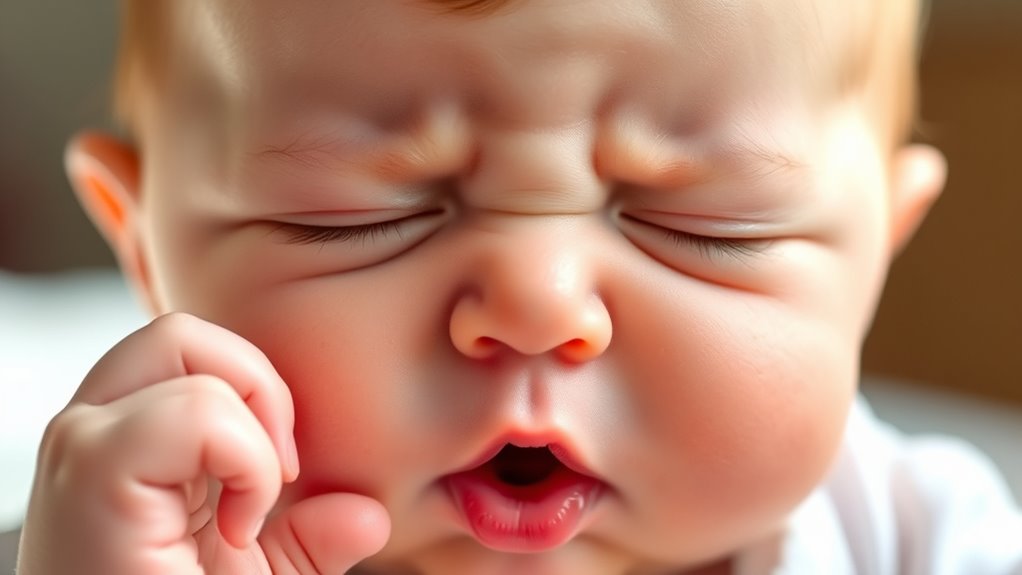
Have you ever wondered why babies seem to sneeze so often? It’s mostly because their immune systems are still developing, making them more sensitive to irritants like dust, pet dander, or strong smells. Babies also have smaller nasal passages, which means even minor particles can trigger a sneeze. Additionally, their noses are more prone to dryness, so sneezing helps clear out mucus or irritants. Sometimes, sneezing is a reflex to sudden changes in light, temperature, or humidity. It’s also common for babies to sneeze when they’re excited or upset. These sneezes are usually harmless and simply part of their natural development process. Your little one’s body is just learning how to protect itself from everyday environmental triggers. Understanding infant immunity can help parents feel reassured about frequent sneezing in babies.
Normal Patterns of Baby Sneezing
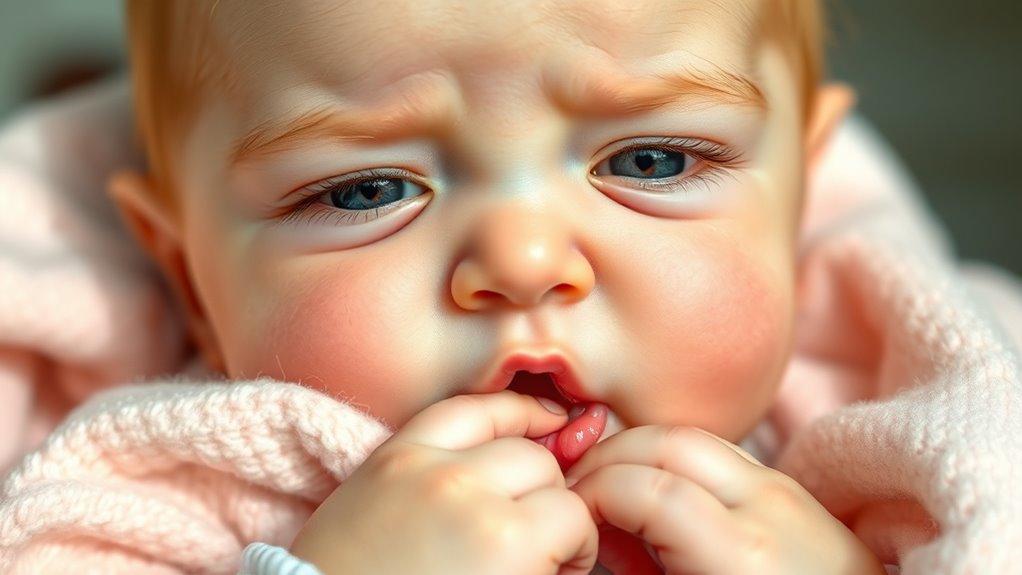
Babies often develop specific patterns of sneezing that are perfectly normal as part of their growth. You might notice your little one sneezes several times in a row, or that they sneeze more when they’re awake or playing. Many babies sneeze frequently in response to bright lights, drafts, or sudden movements. Some infants sneeze whenever they’re exposed to certain smells or dust particles, which helps clear their nasal passages. Sneezing can also happen after feeding or when they’re adjusting to new environments. These patterns are usually harmless and part of their developing immune system. As long as your baby’s sneezing is not accompanied by other signs of illness, such as fever or difficulty breathing, these habits are normal and typically don’t require concern. Understanding normal sneezing patterns can help reassure parents that their baby’s sneezing is part of healthy development.
Signs That Your Baby’s Sneezing May Indicate Illness

While frequent sneezing can be normal, certain signs may indicate your baby is unwell. If your baby shows any of the following, it’s time to consult a doctor:
| Symptom | What it means |
|---|---|
| Fever or chills | Possible infection |
| Persistent coughing or wheezing | Respiratory issues |
| Lethargy or feeding difficulty | Sign of illness or dehydration |
Watch for additional signs like trouble breathing, nasal discharge with foul odor, or if your baby becomes unusually fussy. These symptoms, combined with frequent sneezing, can signal an underlying illness that needs medical attention. Stay alert to your baby’s overall behavior and health cues. If in doubt, always consult your pediatrician for guidance. Recognizing the early warning signs can help ensure your baby receives prompt care when needed.
Common Causes of Excessive Sneezing in Infants
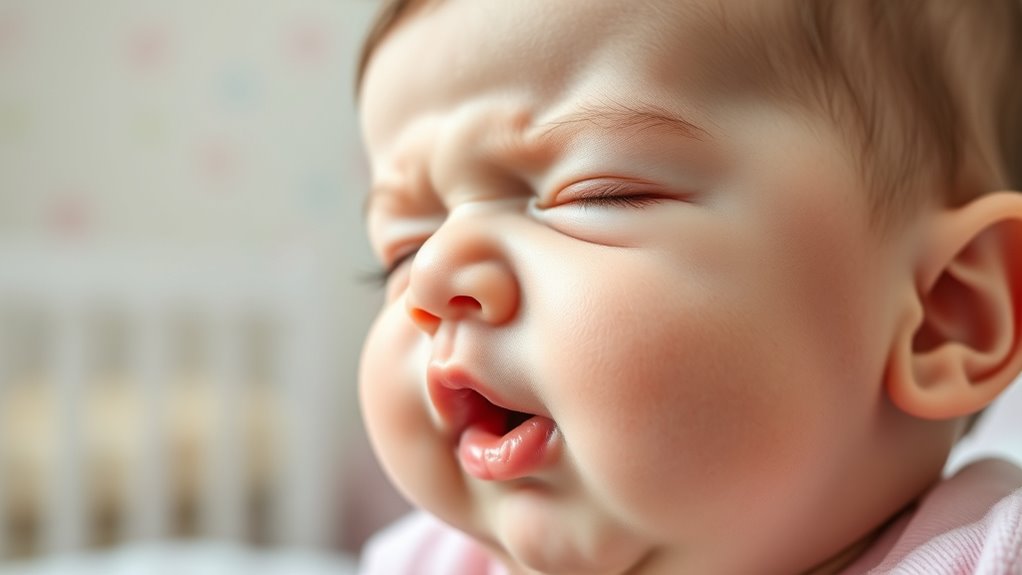
What causes your infant to sneeze excessively? Often, it’s due to harmless factors or minor irritants. First, allergies can trigger frequent sneezing if your baby is sensitive to dust, pet dander, or pollen. Second, environmental irritants like smoke or strong perfumes may irritate their nasal passages. Third, common colds caused by viruses frequently lead to sneezing as your baby’s immune system fights off germs. Keep in mind that infants have sensitive nasal tissues, and even slight irritants can cause multiple sneezes. Additionally, the presence of innovative materials in the environment or new surroundings might influence sneezing patterns. While these causes are usually harmless, monitoring your baby’s symptoms is essential. If sneezing persists or is accompanied by other signs of illness, consult your pediatrician for guidance. Understanding these common causes helps you determine when sneezing is normal or warrants further attention.
How to Differentiate Between Normal and Concerning Sneezing
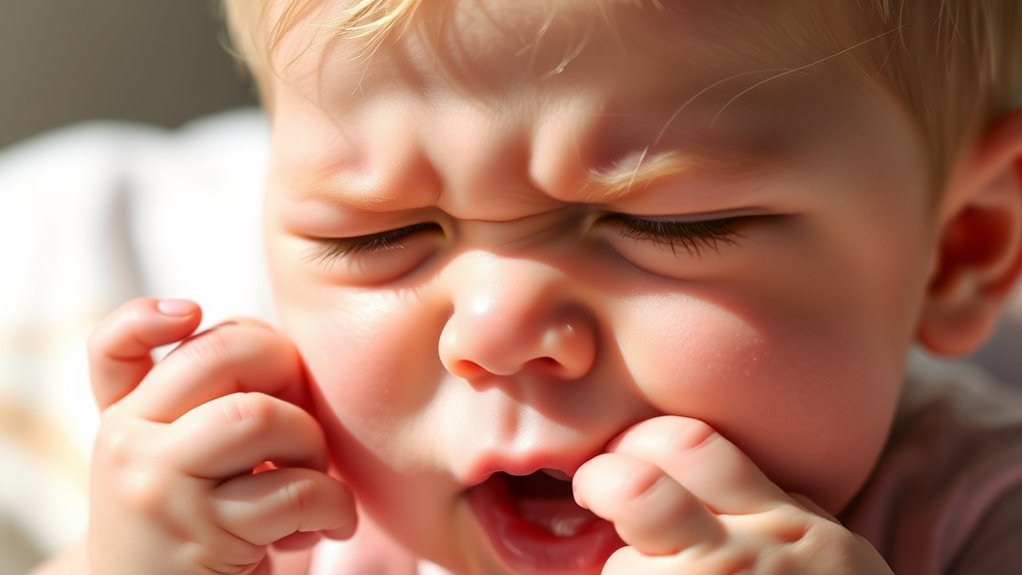
How can you tell if your infant’s sneezing is normal or a sign of a problem? Normal sneezing usually occurs frequently but is brief and doesn’t come with other symptoms. If your baby sneezes without signs of distress, has clear nasal discharge, and seems otherwise comfortable, it’s likely normal. However, concerning sneezing often involves additional symptoms like persistent coughing, difficulty breathing, or bluish lips. If your baby’s sneezing is accompanied by fever, lethargy, or poor feeding, it could indicate an infection or allergy. Keep track of the frequency and context of the sneezing. Color accuracy impacts how vivid and natural the appearance of your baby’s environment feels, and noticing changes can help identify underlying issues. If it seems excessive or is accompanied by worrying signs, it’s best to consult your pediatrician for guidance. Recognizing these differences helps ensure your baby stays healthy.
When to Seek Medical Attention for Your Baby
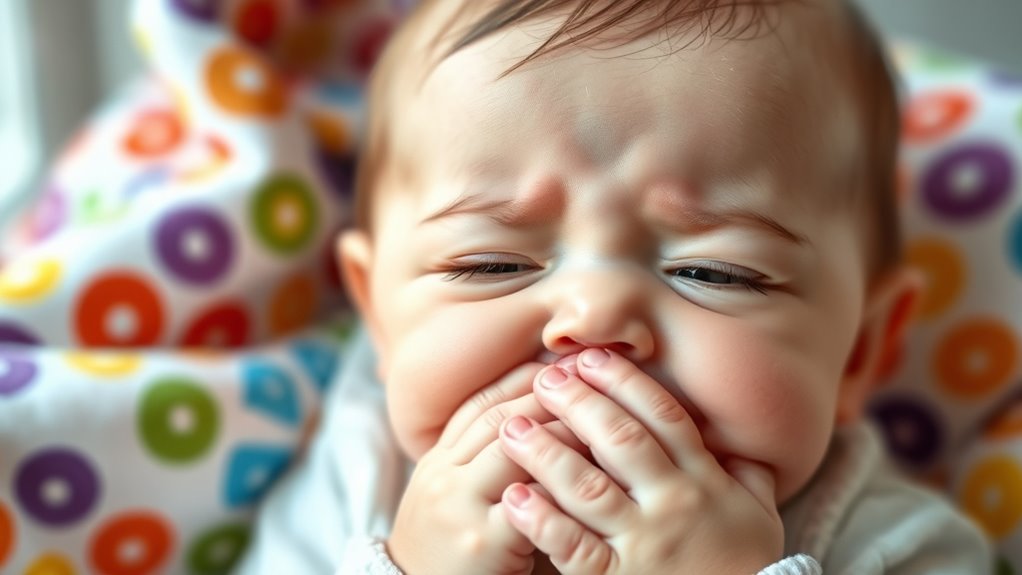
Knowing when to seek medical attention for your baby is essential, especially if their sneezing is accompanied by other concerning symptoms. If your baby shows any of the following, you should consult a healthcare professional promptly:
- Difficulty breathing or rapid breathing
- Fever over 100.4°F (38°C)
- Lethargy, unresponsiveness, or persistent crying
Additionally, if your baby’s sneezing worsens or is accompanied by a rash, refusal to feed, or signs of dehydration like fewer wet diapers, seek medical help immediately. Trust your instincts—if something feels wrong or you’re worried about your baby’s health, don’t hesitate to contact your pediatrician. Early intervention can prevent potential complications and ensure your little one gets the care they need. Proper assessment procedures are crucial for determining the severity of symptoms and the appropriate course of action.
Tips to Help Your Baby Feel Comfortable During Sneezing Episodes
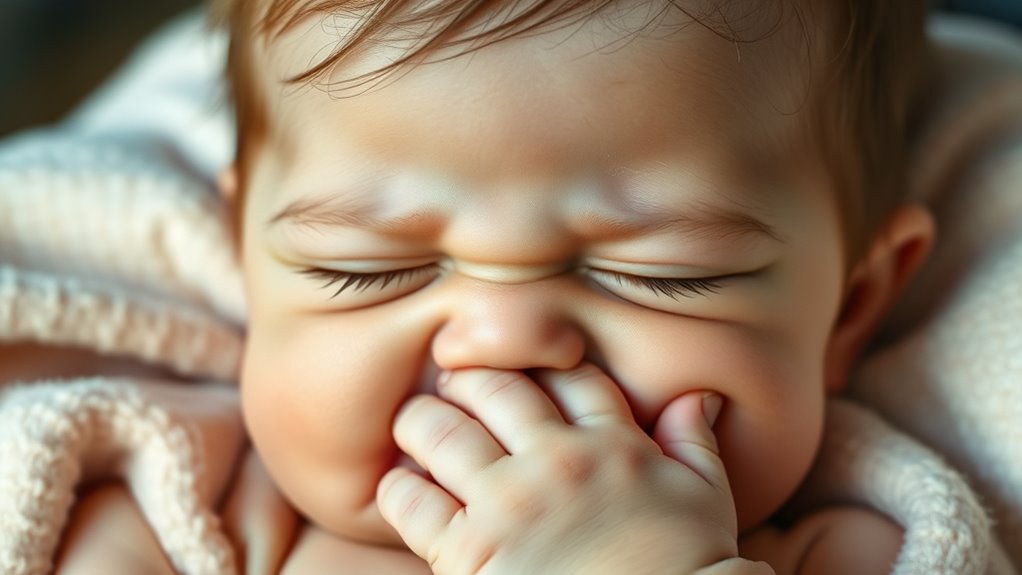
You can help your baby feel more comfortable during sneezing episodes by gently cleaning their nose with a soft, damp cloth. Creating a calm, cozy environment can also ease their discomfort and reduce stress. These simple steps can make a noticeable difference in helping your little one feel better quickly. Additionally, considering best baby products like saline nasal sprays can provide further relief.
Gentle Cleansing Techniques
When your baby sneezes frequently, gentle cleansing can provide comfort and help clear their nasal passages. Using soft, safe techniques makes the process easier for your little one. First, consider using a saline nasal spray or drops to loosen mucus. Gently massage the area around their nose to encourage drainage. Finally, use a soft bulb syringe or nasal aspirator to carefully remove mucus, ensuring you don’t insert it too deep. Remember these tips:
- Use saline spray or drops before attempting to clear the nose.
- Apply gentle, circular massage around the nostrils.
- Use a soft bulb syringe with gentle suction to remove mucus effectively.
These simple steps can help your baby breathe more comfortably during sneezing episodes, making them feel more at ease.
Create a Soothing Environment
Creating a calm and cozy environment can make a big difference in helping your baby feel comfortable during sneezing episodes. Dim the lights and keep noise levels low to create a peaceful space. Use soft blankets and gentle textures to make your baby feel secure. Maintain a comfortable room temperature—not too hot or cold—and consider using a humidifier to add moisture to the air, easing congestion. Keep distractions minimal, avoiding loud sounds or sudden movements. Holding your baby in a gentle, soothing manner can provide reassurance. A familiar, calm setting helps reduce stress and comfort your little one during sneezing fits, making the experience less overwhelming for both of you. Your soothing presence plays a key role in helping your baby feel safe and relaxed. Tuning options can also help improve overall comfort and well-being during illness or congestion.
Preventive Measures to Reduce Sneezing Triggers
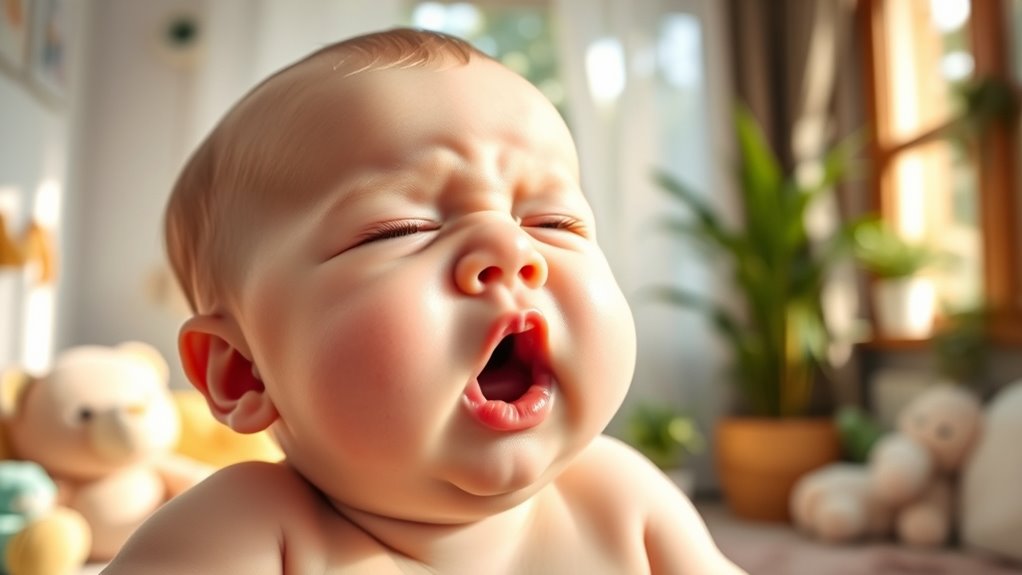
To help reduce sneezing triggers, it’s important to identify and minimize exposure to common irritants. Start by keeping your home clean and dust-free, as dust mites and pet dander often cause sneezing. Use allergy-proof covers on pillows and mattresses. Additionally, control indoor humidity to prevent mold growth, which can trigger allergies. Here are three key steps:
Reduce sneezing by keeping your home clean, dust-free, and controlling humidity to prevent allergens like dust mites, pet dander, and mold.
- Regularly vacuum and dust with a HEPA filter.
- Keep pets out of the baby’s sleeping area.
- Use air purifiers to filter airborne allergens.
Implementing spiritual principles such as patience and gratitude can also help manage stress, which may contribute to allergy symptoms.
Frequently Asked Questions
Can Babies Outgrow Frequent Sneezing as They Age?
You might wonder if your baby will outgrow frequent sneezing as they get older. Typically, babies do become less sneezey over time, especially as their immune systems strengthen and they’re exposed to fewer irritants. However, some children may continue sneezing occasionally into toddlerhood. Keep an eye on other symptoms, and consult your pediatrician if the sneezing is persistent, disruptive, or accompanied by signs of illness.
Are There Specific Foods That May Trigger Sneezing in Infants?
You might notice certain foods trigger your baby’s sneezing, especially if they have food allergies or sensitivities. Common culprits include dairy, eggs, nuts, or soy. When your baby sneezes after eating, try eliminating suspected foods one at a time to see if symptoms improve. Always consult your pediatrician before making big changes, especially if sneezing is frequent or accompanied by other signs of allergy or discomfort.
Does Exposure to Pets Increase Sneezing Episodes in Babies?
While pets bring joy, they can also increase sneezing episodes in babies, especially if your little one has allergies. Exposure to pet dander often triggers nasal irritation and sneezing, making it seem like your baby is constantly battling a cold. If your baby sneezes frequently around pets, consider reducing contact or improving air quality. Monitoring reactions and consulting a pediatrician can help determine if allergies are the cause.
Can Environmental Factors Cause Abnormal Sneezing Patterns?
Environmental factors can definitely cause abnormal sneezing patterns in your baby. Things like dust, pollen, strong odors, or smoke can irritate their sensitive nasal passages, leading to frequent or unusual sneezing. You should monitor these triggers and keep your baby’s environment clean and well-ventilated. If excessive sneezing persists or is accompanied by other symptoms, it’s best to consult your pediatrician to rule out allergies or infections.
Are Natural Remedies Effective for Reducing Infant Sneezing?
Natural remedies can sometimes help diminish your baby’s sneezing, especially if allergies or dry air are triggers. You might try humidifying the room or using saline drops to clear nasal passages. However, always consult your pediatrician before trying remedies, as persistent sneezing could signal an infection or allergy. While natural options can provide relief, professional advice ensures your baby’s health stays on track.
Conclusion
Remember, understanding your baby’s sneezing helps you respond appropriately, whether it’s normal or signals a concern. Pay attention to patterns, watch for signs of illness, and take preventive steps to reduce triggers. Stay observant, stay calm, and stay proactive. Your attentiveness can comfort your baby, ease their sneezing, and keep them healthy. By recognizing the difference, you support their comfort, their health, and their happiness every step of the way.









